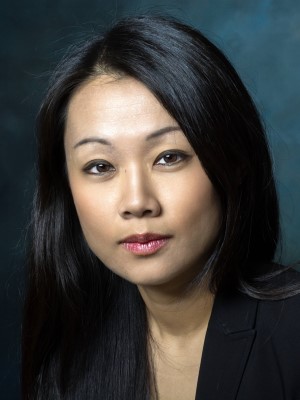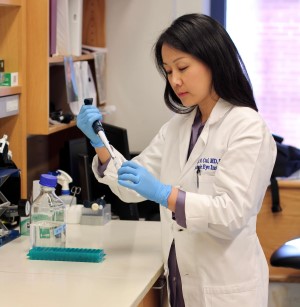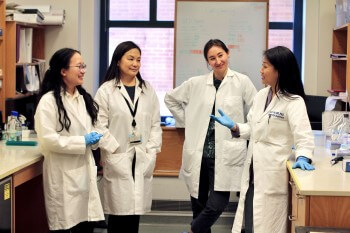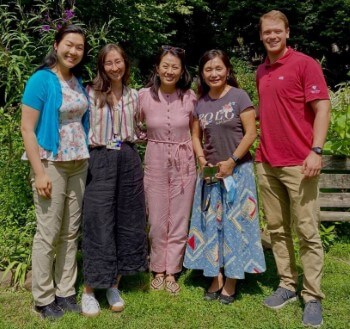Celebrating Asian/Pacific American Heritage Month
Qi Cui, MD, PhD - The importance of self-advocacy for researchers
 Qi (pronounced “Chi”) Cui, MD, PhD, is an assistant professor of ophthalmology at the University of Pennsylvania, Scheie Eye Institute in Philadelphia, Penn. She received her undergraduate degrees in Molecular and Cellular Biology and Psychology from the University of Arizona in Tucson, Ariz. followed by combined MD-PhD (MSTP) training at the University of Rochester in N.Y. where she was also supported by an Individual Predoctoral NRSA (F30). She completed her ophthalmology residency at the University of California in San Francisco, followed by a clinical fellowship in glaucoma at Wills Eye Hospital in Philadelphia, Penn.
Qi (pronounced “Chi”) Cui, MD, PhD, is an assistant professor of ophthalmology at the University of Pennsylvania, Scheie Eye Institute in Philadelphia, Penn. She received her undergraduate degrees in Molecular and Cellular Biology and Psychology from the University of Arizona in Tucson, Ariz. followed by combined MD-PhD (MSTP) training at the University of Rochester in N.Y. where she was also supported by an Individual Predoctoral NRSA (F30). She completed her ophthalmology residency at the University of California in San Francisco, followed by a clinical fellowship in glaucoma at Wills Eye Hospital in Philadelphia, Penn.
Her research examines the effects of genetic factors and neuroinflammation on glaucoma pathogenesis and progression. She was supported by a Mentored Clinical Scientist Development Award (K08) from the National Eye Institute (NEI), is a past recipient of the Young Clinician Scientist Award from the American Glaucoma Society and the Shaffer Grant from the Glaucoma Research Foundation, and recently transitioned to an R01 from the NEI.
Tell us a little about yourself
I was born in Beijing and moved to Tucson, Arizona when I was 10. When I was a child, I wanted to be a teacher, dancer, policy woman, lawyer, artist, interior designer, etc. I had a lot of interests as a kid! I got hooked on science once I took my first high school biology class. In addition to prioritizing my free time for my family. I also enjoy ceramic art, hiking and gardening.
 How did you get into the eye and vision field?
How did you get into the eye and vision field?
I was initially drawn to the eye after doing my PhD in audio-visual integration. I became interested in the subspecialty of glaucoma after realizing I would like to contribute to expanding available treatment options for my patients with glaucoma. My research then (somewhat unexpectedly) led me to explore neuroinflammation in glaucoma pathophysiology.
What are some things in your field that you love/enjoy?
The people. I have been lucky enough to benefit from terrific mentors and colleagues both on the scientific and clinical sides. The journey is not always easy but having great people around me has helped.
The science. The eye is one of those rare organs where what you “see” is what you get. No pun intended! Being able to directly visualize pathology has made experiments much more rewarding for me.
 In your opinion, what obstacles do Asian and Pacific Islander Americans still face in this industry?
In your opinion, what obstacles do Asian and Pacific Islander Americans still face in this industry?
AAPIs face many of the obstacles characteristic to underrepresented individuals but this is not always sufficiently recognized, and in particular by funding organizations. More recently there has been a concerted effort to establish more initiatives, programs, and resources to support underrepresented individuals, which is a great start. However, we need to continue to do more while remaining cognizant of the fact that although some AAPIs are not traditionally underrepresented in science, the obstacles we face as we try to advance our careers are nevertheless real and significant.
Tell us how you found opportunities to help you grow in your career.
By being proactive and advocating for myself! This includes serving in national organizations like ARVO and asking to be invited to talks whenever appropriate. This does not always come naturally to me but has been absolutely necessary for securing the resources for career and scientific advancement.
 Do you have any pearls of wisdom for young Asian/Pacific Americans entering or currently in the field?
Do you have any pearls of wisdom for young Asian/Pacific Americans entering or currently in the field?
Start cultivating resilience. Experiments will fail and many grants will be a miss. This will happen to everyone so forgive yourself when it happens. Also, practice saying no. Not every opportunity will benefit you or your science. It’s ok to say no to those that are not interesting to you and/or do not align with your career and research priorities.
